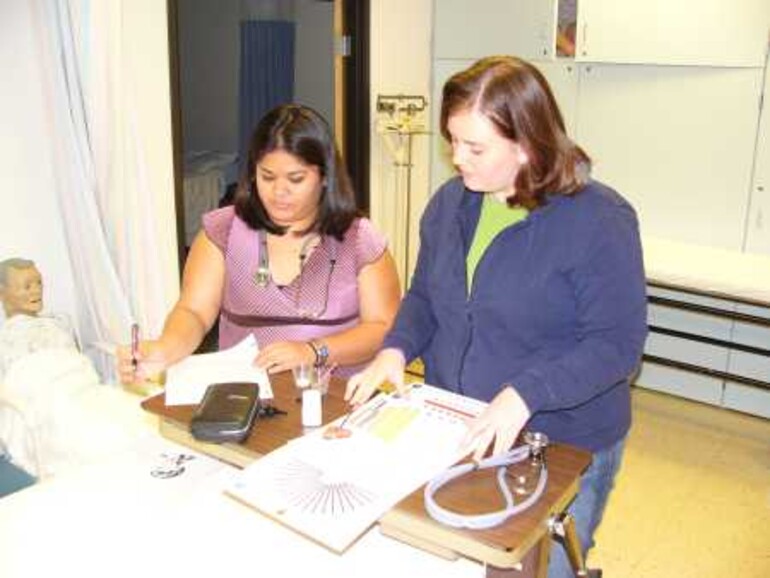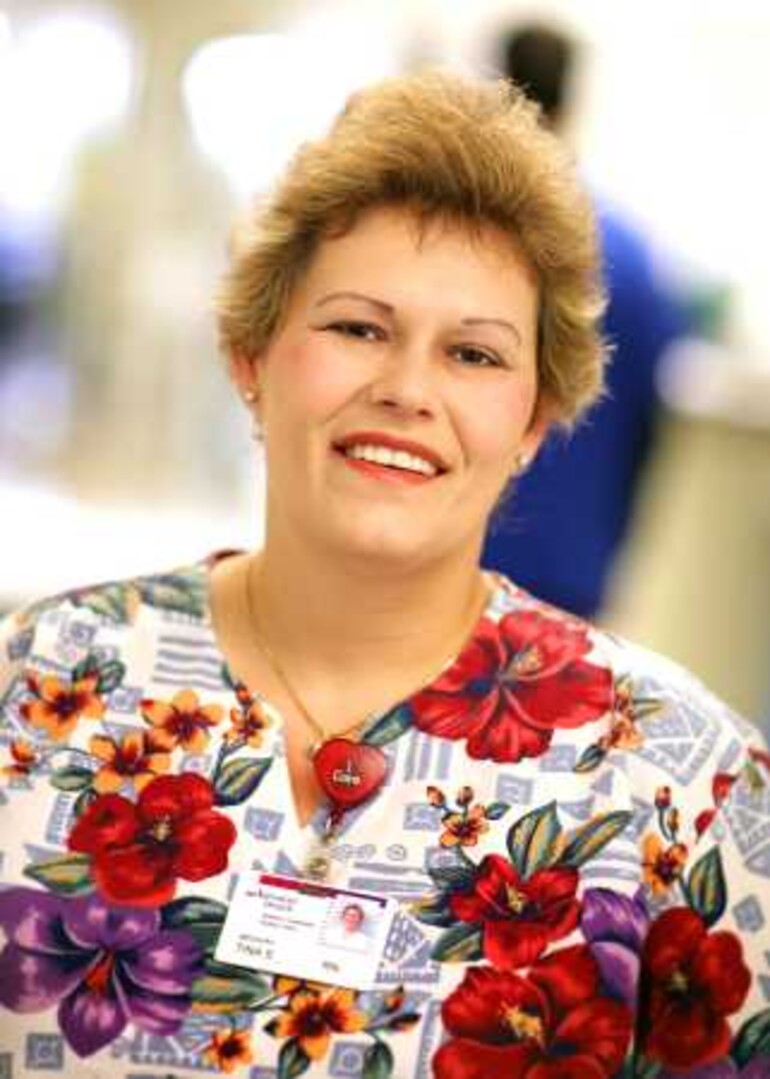Helping Nurses Succeed At Adventist Health, we know how important nurses are to our business. That’s why we’re committed to finding top-notch clinicians and providing them with the tools they need to deliver excellent patient care and succeed in their careers. Teaming Up for Clinicals Across our four-state system, numerous Adventist Health hospitals partner with local colleges and universities to provide clinical rotations to student nurses. Not only do these collaborations benefit students by providing real-world learning experiences, they enable hospitals to scout for new talent. Walla Walla General Hospital (WWGH) in Walla Walla, Washington, serves as a clinical site for nursing students at Walla Walla College (WWC) and Walla Walla Community College. According to Marj Simons, BSN, MS, vice president of patient care services at WWGH, the collaboration is a benefit to both the students and the hospital. “Partnering with our local colleges gives us a chance to get to know the students and gives them the opportunity to become familiar with our culture and mission,” Marj said. “By the time graduation comes around, many of them are very interested in working at our facility because of their clinical experience here.” Likewise, Adventist Medical Center (AMC) in Portland, Oregon, partners with seven area schools for clinical rotations. “Each year, more than 350 students work in our hospital as part of their nursing education,” stated Carol Kunau, BSN, MBA, vice president of patient care services at AMC. “It’s a wonderful way for them to enhance their clinical skills and to learn about our distinctive mission.” New Grad Programs According to Wynelle Huff, RN, PhD, vice president of delivery of care for Adventist Health, each of the system's 20 hospitals offers some type of new graduate orientation/training for new nurses. At Tillamook County General Hospital (TCGH) on the Oregon coast, new graduate training is offered as needed. The hospital’s program—which is similar to others throughout Adventist Health—runs for approximately three months and consists of approximately six days of classroom education and 10 to 12 weeks of supervised care giving under the guidance of an experienced preceptor or nurse mentor. "This program is a wonderful way to help our new grads become independent," stated Donna Bechthold, RN, BA, vice president of patient care at TCGH. "It gives them the opportunity to become acclimated to their new jobs and helps orient them to day-to-day patient care under the guidance of an experienced clinician." Likewise, AMC’s graduate nurse internship program orients a host of new nursing graduates each year. Designed to be flexible so that the program can be adapted to each new grad’s needs, competency assessments test critical-thinking skills to determine how much orientation and mentoring each new nurse will need. Continuing Education In addition to on-the-job training, many system facilities partner with various schools of nursing in order to enhance career opportunities for students and give them the chance to pursue educational advancements. AMC has a very special relationship with WWC. In fact, the WWC School of Nursing and dorm are located right on the hospital’s main campus! “It’s a win-win situation for both the students and the hospital,” said Carol Kunau. “Not only is it a wonderful recruitment opportunity for the hospital, some of the students are hired as nursing technicians while they are still in school.” Lucille Krull, RN, PhD, FNP, dean of the School of Nursing at WWC, echoes Carol’s sentiments about the relationship. “Having our nursing program on the hospital campus is definitely an advantage,” said Lucille. “We have access to many of the services the hospital provides, such as their cafeteria, maintenance department and security. In addition, the hospital employs students as CNAs and provides a wealth of experts that the college can call upon for support.” In California, Pacific Union College’s LVN to RN program, a partnership with Hanford Community Medical Center (HCMC) and Ukiah Valley Medical Center is another example of a successful educational collaboration. The 18-month program, which to date has graduated 153 students, offers on-site classes at both hospitals, designed specifically for working adults. “The LVN to RN program is a huge benefit to our employees,” stated Carol Hasselbrack, vice president of patient care services at HCMC. “It allows our nurses to pursue professional growth while meeting other job and life obligations. For many, it’s the only opportunity to further their nursing education.” In addition, many Adventist Health facilities offer free continuing education credits and a variety of other professional-growth opportunities to nurses, including tuition reimbursement programs. Adventist Health also helps fund Seventh-day Adventist nursing programs, and many hospitals offer scholarships to nursing students. "We are always exploring creative ways to collaborate with educational entities in order to produce the best possible outcomes for the schools, our facilities and our nurses,” stated Wynelle Huff.
Helping Nurses Succeed
At Adventist Health, we know how important nurses are to our business. That’s why we’re committed to finding top-notch clinicians and providing them with the tools they need to deliver excellent patient care and succeed in their careers.
Teaming Up for Clinicals
Across our four-state system, numerous Adventist Health hospitals partner with local colleges and universities to provide clinical rotations to student nurses. Not only do these collaborations benefit students by providing real-world learning experiences, they enable hospitals to scout for new talent.
Walla Walla General Hospital (WWGH) in Walla Walla, Washington, serves as a clinical site for nursing students at Walla Walla College (WWC) and Walla Walla Community College.
According to Marj Simons, BSN, MS, vice president of patient care services at WWGH, the collaboration is a benefit to both the students and the hospital.
“Partnering with our local colleges gives us a chance to get to know the students and gives them the opportunity to become familiar with our culture and mission,” Marj said. “By the time graduation comes around, many of them are very interested in working at our facility because of their clinical experience here.”
Likewise, Adventist Medical Center (AMC) in Portland, Oregon, partners with seven area schools for clinical rotations.
“Each year, more than 350 students work in our hospital as part of their nursing education,” stated Carol Kunau, BSN, MBA, vice president of patient care services at AMC. “It’s a wonderful way for them to enhance their clinical skills and to learn about our distinctive mission.”
New Grad Programs
According to Wynelle Huff, RN, PhD, vice president of delivery of care for Adventist Health, each of the system's 20 hospitals offers some type of new graduate orientation/training for new nurses.
At Tillamook County General Hospital (TCGH) on the Oregon coast, new graduate training is offered as needed. The hospital’s program—which is similar to others throughout Adventist Health—runs for approximately three months and consists of approximately six days of classroom education and 10 to 12 weeks of supervised care giving under the guidance of an experienced preceptor or nurse mentor.
"This program is a wonderful way to help our new grads become independent," stated Donna Bechthold, RN, BA, vice president of patient care at TCGH. "It gives them the opportunity to become acclimated to their new jobs and helps orient them to day-to-day patient care under the guidance of an experienced clinician."
Likewise, AMC’s graduate nurse internship program orients a host of new nursing graduates each year. Designed to be flexible so that the program can be adapted to each new grad’s needs, competency assessments test critical-thinking skills to determine how much orientation and mentoring each new nurse will need.
Continuing Education
In addition to on-the-job training, many system facilities partner with various schools of nursing in order to enhance career opportunities for students and give them the chance to pursue educational advancements.
AMC has a very special relationship with WWC. In fact, the WWC School of Nursing and dorm are located right on the hospital’s main campus!
“It’s a win-win situation for both the students and the hospital,” said Carol Kunau. “Not only is it a wonderful recruitment opportunity for the hospital, some of the students are hired as nursing technicians while they are still in school.”
Lucille Krull, RN, PhD, FNP, dean of the School of Nursing at WWC, echoes Carol’s sentiments about the relationship.
“Having our nursing program on the hospital campus is definitely an advantage,” said Lucille. “We have access to many of the services the hospital provides, such as their cafeteria, maintenance department and security. In addition, the hospital employs students as CNAs and provides a wealth of experts that the college can call upon for support.”
In California, Pacific Union College’s LVN to RN program, a partnership with Hanford Community Medical Center (HCMC) and Ukiah Valley Medical Center is another example of a successful educational collaboration. The 18-month program, which to date has graduated 153 students, offers on-site classes at both hospitals, designed specifically for working adults.
“The LVN to RN program is a huge benefit to our employees,” stated Carol Hasselbrack, vice president of patient care services at HCMC. “It allows our nurses to pursue professional growth while meeting other job and life obligations. For many, it’s the only opportunity to further their nursing education.”
In addition, many Adventist Health facilities offer free continuing education credits and a variety of other professional-growth opportunities to nurses, including tuition reimbursement programs. Adventist Health also helps fund Seventh-day Adventist nursing programs, and many hospitals offer scholarships to nursing students.
"We are always exploring creative ways to collaborate with educational entities in order to produce the best possible outcomes for the schools, our facilities and our nurses,” stated Wynelle Huff.











